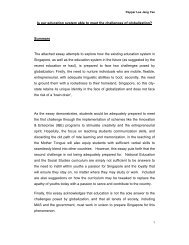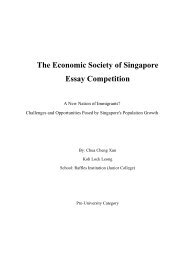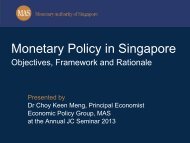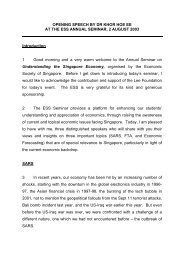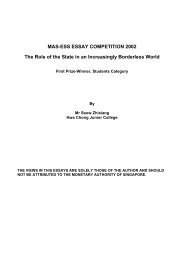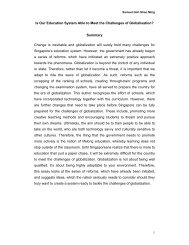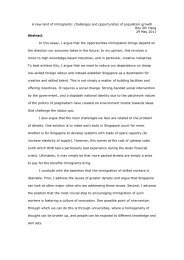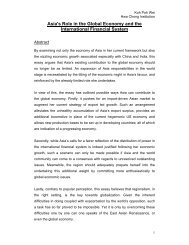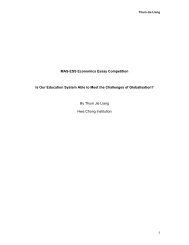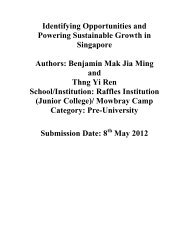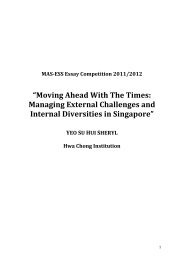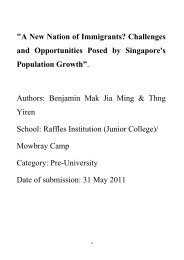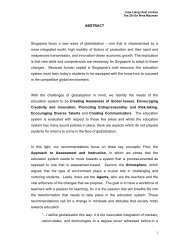the role of the state in an increasingly borderless world - Economic ...
the role of the state in an increasingly borderless world - Economic ...
the role of the state in an increasingly borderless world - Economic ...
- No tags were found...
You also want an ePaper? Increase the reach of your titles
YUMPU automatically turns print PDFs into web optimized ePapers that Google loves.
Strong trade unions c<strong>an</strong> also br<strong>in</strong>g about unemployment by keep<strong>in</strong>g wages at artificially<br />
high levels. This discourages firms from employ<strong>in</strong>g more people. Moreover, wage <strong>in</strong>crements<br />
that exceed productivity ga<strong>in</strong>s result <strong>in</strong> higher costs to <strong>the</strong> firms <strong>an</strong>d reduce its competitiveness.<br />
Trade unions also hamper a country’s restructur<strong>in</strong>g efforts by resist<strong>in</strong>g lay<strong>of</strong>fs. The solution is<br />
for <strong>state</strong>s to dim<strong>in</strong>ish <strong>the</strong> power <strong>of</strong> trade unions, ei<strong>the</strong>r via legislation or <strong>state</strong>-s<strong>an</strong>ctioned<br />
arbitration. States should make it easier for firms to hire <strong>an</strong>d fire, <strong>an</strong>d reduce wage rigidities <strong>in</strong><br />
<strong>the</strong> labour market.<br />
Governments should also view <strong>the</strong> development <strong>of</strong> hum<strong>an</strong> capital as a competitive<br />
strategy to attract foreign <strong>in</strong>vestments <strong>an</strong>d boost productivity. To start with, <strong>the</strong> education<br />
system should be revamped to discourage rote learn<strong>in</strong>g, emphasize creativity <strong>an</strong>d research,<br />
<strong>an</strong>d create enterpris<strong>in</strong>g, visionary leaders. Education must keep pace with rapidly ch<strong>an</strong>g<strong>in</strong>g<br />
technology <strong>an</strong>d teach<strong>in</strong>g methodology. Indeed, <strong>the</strong> modern <strong>the</strong>ory <strong>of</strong> hum<strong>an</strong> capital<br />
development is not simply about <strong>in</strong>creas<strong>in</strong>g <strong>the</strong> time one spends be<strong>in</strong>g educated, but<br />
<strong>in</strong>creas<strong>in</strong>gly, also about improv<strong>in</strong>g <strong>the</strong> quality <strong>of</strong> <strong>the</strong> education one receives.<br />
Likewise, <strong>state</strong>s ought to reduce <strong>the</strong>ir reli<strong>an</strong>ce on foreign unskilled workers, <strong>an</strong>d step up<br />
efforts to attract highly-skilled people from abroad. States that give firms easy access to foreign<br />
unskilled labour will impede <strong>the</strong> <strong>in</strong>dustries’ restructur<strong>in</strong>g process <strong>an</strong>d depress local wages, while<br />
lower<strong>in</strong>g <strong>the</strong> skill pr<strong>of</strong>ile <strong>of</strong> <strong>the</strong> workforce. This will lead to long-term <strong>in</strong>efficiency <strong>an</strong>d a loss <strong>of</strong><br />
competitiveness <strong>in</strong> <strong>the</strong>se <strong>in</strong>dustries. Highly-skilled foreign labour, on <strong>the</strong> o<strong>the</strong>r h<strong>an</strong>d, c<strong>an</strong> share<br />
<strong>the</strong>ir expertise with <strong>the</strong> local workforce, lead<strong>in</strong>g to technology tr<strong>an</strong>sfer. Skilled labour is <strong>of</strong>ten <strong>in</strong><br />
shortage, result<strong>in</strong>g <strong>in</strong> structural bottlenecks that limit <strong>in</strong>dustry growth. The <strong>in</strong>flux <strong>of</strong> such<br />
<strong>in</strong>dividuals c<strong>an</strong> help to resolve such bottlenecks, raise productivity levels <strong>an</strong>d <strong>in</strong>crease<br />
employment opportunities for <strong>the</strong> economy as a whole. In S<strong>in</strong>gapore, such ‘foreign talent’ are<br />
attracted via a ch<strong>an</strong>ge <strong>in</strong> immigration policy, encourag<strong>in</strong>g <strong>the</strong>m to settle here perm<strong>an</strong>ently, <strong>an</strong>d<br />
low <strong>in</strong>come taxes. Construction firms are also discouraged from employ<strong>in</strong>g unskilled foreign<br />
labour as <strong>the</strong>y <strong>in</strong>cur higher levy payments.<br />
Develop<strong>in</strong>g <strong>an</strong>d <strong>in</strong>creas<strong>in</strong>g <strong>the</strong> pool <strong>of</strong> hum<strong>an</strong> capital will thus enable <strong>state</strong>s to <strong>in</strong>crease<br />
<strong>the</strong>ir productivity <strong>an</strong>d <strong>in</strong>ternational competitiveness, while reduc<strong>in</strong>g unemployment. In addition,<br />
a more mobile labour market c<strong>an</strong> contribute to <strong>the</strong> diffusion <strong>of</strong> know-how through <strong>the</strong> workforce.<br />
II)<br />
Encourag<strong>in</strong>g R&D <strong>an</strong>d Technopreneurship<br />
Technology is <strong>the</strong> driv<strong>in</strong>g force beh<strong>in</strong>d <strong>the</strong> new knowledge-based economy created by<br />
globalisation. However, m<strong>an</strong>y countries, <strong>in</strong> particular S<strong>in</strong>gapore, tend to be over-dependent on<br />
technological tr<strong>an</strong>sfer from foreign MNCs based <strong>in</strong> <strong>the</strong> country. Hence, <strong>the</strong>re is a dearth <strong>of</strong><br />
<strong>in</strong>digenous research <strong>an</strong>d development (R&D), which requires <strong>state</strong>s to implement a national<br />
science <strong>an</strong>d technology policy to promote it.<br />
Such a policy would, first <strong>an</strong>d foremost, necessitate that <strong>the</strong> <strong>state</strong> <strong>in</strong>creases government<br />
<strong>in</strong>vestment <strong>in</strong> R&D activities to levels comparable with adv<strong>an</strong>ced <strong>in</strong>dustrialised countries.<br />
Industrialised countries like <strong>the</strong> US <strong>an</strong>d Jap<strong>an</strong> spend 2.84 <strong>an</strong>d 3.06 percent <strong>of</strong> <strong>the</strong>ir GDP on<br />
R&D, while S<strong>in</strong>gapore <strong>an</strong>d Taiw<strong>an</strong> pale <strong>in</strong> comparison, with a R&D/GDP ratio <strong>of</strong> 1.84 <strong>an</strong>d 1.98<br />
percent respectively 4 .<br />
Fur<strong>the</strong>r, <strong>state</strong>s will have to focus on basic research, <strong>an</strong>d not just applied research to ga<strong>in</strong><br />
a more last<strong>in</strong>g competitive adv<strong>an</strong>tage <strong>in</strong> <strong>the</strong> market. Emphasis will have to be placed on<br />
creat<strong>in</strong>g break-through technologies <strong>an</strong>d <strong>an</strong>ticipat<strong>in</strong>g future problems <strong>of</strong> <strong>in</strong>dustries. Produc<strong>in</strong>g<br />
m<strong>an</strong>y copycat technopreneurial start-ups based on exist<strong>in</strong>g technology <strong>of</strong>ten po<strong>in</strong>ts to a lack <strong>of</strong><br />
technological depth, <strong>an</strong>d <strong>the</strong>se may be easily overtaken by foreign competition. On <strong>the</strong> o<strong>the</strong>r<br />
4 National R&D Survey <strong>of</strong> S<strong>in</strong>gapore, 1999, NSTB (2000)<br />
52



